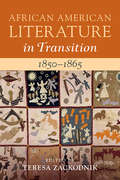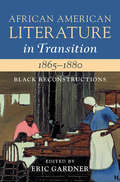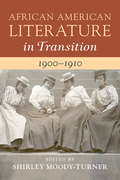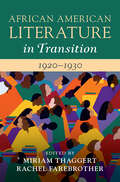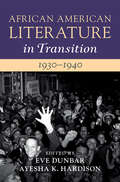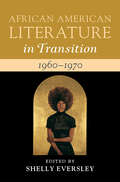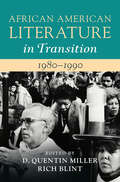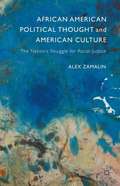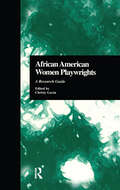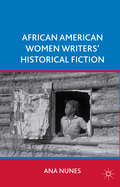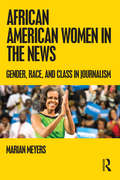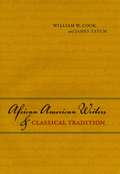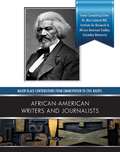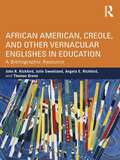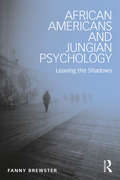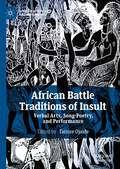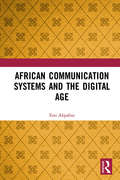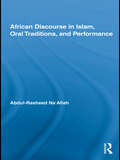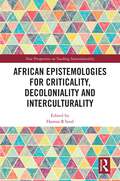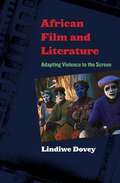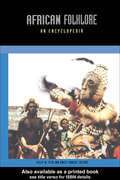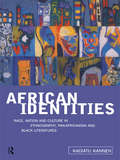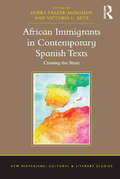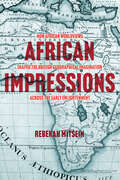- Table View
- List View
African American Literature in Transition, 1850–1865: Volume 4, 1850–1865 (African American Literature in Transition)
by Teresa ZackodnikThe period of 1850-1865 consisted of violent struggle and crisis as the United States underwent the prodigious transition from slaveholding to ostensibly 'free' nation. This volume reframes mid-century African American literature and challenges our current understandings of both African American and American literature. It presents a fluid tradition that includes history, science, politics, economics, space and movement, the visual, and the sonic. Black writing was highly conscious of transnational and international politics, textual circulation, and revolutionary imaginaries. Chapters explore how Black literature was being produced and circulated; how and why it marked its relation to other literary and expressive traditions; what geopolitical imaginaries it facilitated through representation; and what technologies, including print, enabled African Americans to pursue such a complex and ongoing aesthetic and political project.
African American Literature in Transition, 1865–1880: Black Reconstructions (African American Literature in Transition)
by Eric GardnerThis volume offers the most nuanced treatment available of Black engagement with print in the transitional years after the Civil War. It locates and studies materials that many literary historians leave out of narratives of American culture. But as important as such recovery work is, African American Literature in Transition, 1865–1880 also emphasizes innovative approaches, recognizing that such recovery inherently challenges methods dominant in American literary study. At the book's core is the recognition that many period texts - by writers from Frances Ellen Watkins Harper and William Wells Brown to Mattie Jackson and William Steward - are not only aesthetically striking but also central to understanding key socio-historical and cultural trends in the nineteenth century. Chapters by leading scholars are grouped in three sections - 'Citizenships, Textualities, and Domesticities', 'Persons and Bodies', and 'Memories, Materialities, and Locations' - and focus on debates over race, nation, personhood, and print that were central to Reconstruction.
African American Literature in Transition, 1900–1910: Volume 7 (African American Literature in Transition)
by Shirley Moody-TurnerAfrican American Literature in Transition, 1900–1910 offers a wide ranging, multi-disciplinary approach to early twentieth century African American literature and culture. It showcases the literary and cultural productions that took shape in the critical years after Reconstruction, but before the Harlem Renaissance, the period known as the nadir of African American history. It undercovers the dynamic work being done by Black authors, painters, photographers, poets, editors, boxers, and entertainers to shape 'New Negro' identities and to chart a new path for a new century. The book is structured into four key areas: Black publishing and print culture; innovations in genre and form; the race, class and gender politics of literary and cultural production; and new geographies of Black literary history. These overarching themes, along with the introduction of established figures and movement, alongside lesser known texts and original research, offer a radical re-conceptualization of this critical, but understudied period in African American literary history.
African American Literature in Transition, 1920–1930: Volume 9 (African American Literature in Transition)
by Rachel Farebrother Miriam ThaggertAfrican American Literature in Transition, 1920-1930 presents original essays that map ideological, historical, and cultural shifts in the 1920s. Complicating the familiar reading of the 1920s as a decade that began with a spectacular boom and ended with disillusionment and bust, the collection explores the range and diversity of Black cultural production. Emphasizing a generative contrast between the ephemeral qualities of periodicals, clothes, and décor and the relative fixity of canonical texts, this volume captures in its dynamics a cultural movement that was fluid and expansive. Chapters by leading scholars are grouped into four sections: 'Habitus, Sound, Fashion'; 'Spaces: Chronicles of Harlem and Beyond'; 'Uplift Renewed: Religion, Protest, and Education,' and 'Serial Reading: Magazines and Periodical Culture.'
African American Literature in Transition, 1930–1940: Volume 10 (African American Literature in Transition)
by Ayesha K. Hardison Eve DunbarThe volume explores 1930s African American writing to examine Black life, culture, and politics to document the ways Black artists and everyday people managed the Great Depression's economic impact on the creative and the social. Essays engage iconic figures such as Sterling Brown, Langston Hughes, Zora Neale Hurston, Dorothy West, and Richard Wright as well as understudied writers such as Arna Bontemps and Marita Bonner, Henry Lee Moon, and Roi Ottley. This book demonstrates the significance of the New Deal's Works Progress Administration (WPA), the Communist Party of the United States (CPUSA) and Black literary circles in the absence of white patronage. By featuring novels, poetry, short fiction, and drama alongside guidebooks, photographs, and print culture, African American Literature in Transition 1930-1940 provides evidence of the literary culture created by Black writers and readers during a period of economic precarity, expanded activism for social justice, and urgent internationalism.
African American Literature in Transition, 1960–1970: Black Art, Politics, and Aesthetics (African American Literature in Transition)
by Shelly EversleyThis volume considers innovations, transitions, and traditions in both familiar and unfamiliar texts and moments in 1960s African American literature and culture. It interrogates declarations of race, authenticity, personal and collective empowerment, political action, and aesthetics within this key decade. It is divided into three sections. The first section engages poetry and music as pivotal cultural form in 1960s literary transitions. The second section explains how literature, culture, and politics intersect to offer a blueprint for revolution within and beyond the United States. The final section addresses literary and cultural moments that are lesser-known in the canon of African American literature and culture. This book presents the 1960s as a unique commitment to art, when 'Black' became a political identity, one in which racial social justice became inseparable from aesthetic practice.
African American Literature in Transition, 1980–1990: Volume 15 (African American Literature in Transition)
by Rich Blint D. Quentin MillerAfrican American Literature in Transition, 1980–1990 tracks Black expressive culture in the 1980s as novelists, poets, dramatists, filmmakers, and performers grappled with the contradictory legacies of the civil rights era, and the start of culture wars and policy machinations that would come to characterize the 1990s. The volume is necessarily interdisciplinary and critically promiscuous in its methodologies and objects of study as it reconsiders conventional temporal, spatial, and moral understandings of how African American letters emerged immediately after the movement James Baldwin describes as the 'latest slave rebellion.' As such, the question of the state of America's democratic project as refracted through the literature of the shaping presence of African Americans is one of the guiding concerns of this volume preoccupied with a moment in American literary history still burdened by the legacies of the 1960s, while imagining the contours of an African Americanist future in the new millennium.
African American Political Thought and American Culture: The Nation's Struggle For Racial Justice
by Alex ZamalinThis book demonstrates how certain African American writers radically re-envisioned core American ideals in order to make them serviceable for racial justice. Each writer's unprecedented reconstruction of key American values has the potential to energize American citizenship today.
African American Slang
by Maciej WidawskiIn this pioneering exploration of African American slang - a highly informal vocabulary and a significant aspect of African American English - Maciej Widawski explores patterns of form, meaning, theme and function, showing it to be a rule-governed, innovative and culturally revealing vernacular. Widawski's comprehensive description is based on a large database of contextual citations from thousands of contemporary sources, including literature and the press, music, film and television. It also includes an alphabetical glossary of 1,500 representative slang expressions, defined and illustrated by 4,500 usage examples. Due to its vast size, the glossary can stand alone as a dictionary providing readers with a reliable reference of terms. Combining scholarship with user-friendliness, this book is an insightful and practical resource for students and researchers in linguistics and general readers interested in exploring lexical variation in contemporary English.
African American Women Playwrights: A Research Guide (Critical Studies in Black Life and Culture #31)
by Christy GavinFirst Published in 1999. Routledge is an imprint of Taylor & Francis, an informa company.
African American Women Writers’ Historical Fiction
by Ana NunesThis volume explores African American historical fiction written by women in the last four decades of the twentieth century. Nunes' approach to the texts aims at emphasizing the narrative and thematic achievements of individual novels set in the context of the main trends and developments of the contemporary African American historical novel.
African American Women in the News: Gender, Race, and Class in Journalism
by Marian MeyersAfrican American Women in the News offers the first in-depth examination of the varied representations of Black women in American journalism, from analyses of coverage of domestic abuse and "crack mothers" to exploration of new media coverage of Michelle Obama on Youtube. Marian Meyers interrogates the complex and often contradictory images of African American women in news media through detailed studies of national and local news, the mainstream and Black press, and traditional news outlets as well as newer digital platforms. She argues that previous studies of African Americans and the news have largely ignored the representations of women as distinct from men, and the ways in which socioeconomic class can be a determining factor in how Black women are portrayed in the news. Meyers also proposes that a pattern of paternalistic racism, as distinct from the "modern" racism found in previous studies of news coverage of African Americans, is more likely to characterize the media's treatment of African American women. Drawing on critical cultural studies and black feminist theory concerning representation and the intersectionality of gender, race and class, Meyers goes beyond the cultural myths and stereotypes of African American women to provide an updated portrayal of Black women today. African American Women in the News is ideal for courses on African American studies, American studies, journalism studies, media studies, sociology studies, women’s studies and for professional journalists and students of journalism who seek to improve the diversity and sensitivity of their journalistic practice.
African American Writers & Classical Tradition
by James Tatum William W. CookConstraints on freedom, education, and individual dignity have always been fundamental in determining who is able to write, when, and where. Considering the singular experience of the African American writer, William W. Cook and James Tatum here argue that African American literature did not develop apart from canonical Western literary traditions but instead grew out of those literatures, even as it adapted and transformed the cultural traditions and religions of Africa and the African diaspora along the way.Tracing the interaction between African American writers and the literatures of ancient Greece and Rome, from the time of slavery and its aftermath to the civil rights era and on into the present, the authors offer a sustained and lively discussion of the life and work of Phillis Wheatley, Frederick Douglass, Ralph Ellison, and Rita Dove, among other highly acclaimed poets, novelists, and scholars. Assembling this brilliant and diverse group of African American writers at a moment when our understanding of classical literature is ripe for change, the authors paint an unforgettable portrait of our own reception of “classic” writing, especially as it was inflected by American racial politics.
African American Writers and Journalists (Major Black Contributions from Emancipat)
by Mary Hertz ScarbroughAfrican-American Writers and Journalists spans nearly three centuries of literary and journalistic history, from a long-unpublished ballad composed in the 1740s by a slave named Lucy Terry to the works of the Nobel Prize-winning novelist Toni Morrison. It tells the stories of figures such as Frederick Douglass, whose towering intellect and powerful prose helped animate the movement to abolish slavery; Ida B. Wells and Charlotta Bass, journalists who risked their lives to report on racial violence and injustice; and Ralph Ellison and Richard Wright, who challenged society with hard questions about race and equality.
African American, Creole, and Other Vernacular Englishes in Education: A Bibliographic Resource (NCTE-Routledge Research Series)
by John R. Rickford Julie Sweetland Angela E. Rickford Thomas GranoMore than 50 years of scholarly attention to the intersection of language and education have resulted in a rich body of literature on the role of vernacular language varieties in the classroom. This field of work can be bewildering in its size and variety, drawing as it does on the diverse methods, theories, and research paradigms of fields such as sociolinguistics, applied linguistics, psychology, and education. Compiling most of the publications from the past half century that deal with this critical topic, this volume includes more than 1600 references (books, articles in journals or books, and web-accessible dissertations and other works) on education in relation to African American Vernacular English [AAVE], English-based pidgins and creoles, Latina/o English, Native American English, and other English vernaculars such as Appalachian English in the United States and Aboriginal English in Australia), with accompanying abstracts for approximately a third of them. This comprehensive bibliography provides a tool useful for those interested in the complex issue of how knowledge about language variation can be used to more effectively teach students who speak a nonstandard or stigmatized language variety.
African Americans and Jungian Psychology: Leaving the Shadows
by Fanny BrewsterAfrican Americans and Jungian Psychology: Leaving the Shadows explores the little-known racial relationship between the African diaspora and C.G. Jung’s analytical psychology. In this unique book, Fanny Brewster explores the culture of Jungian psychology in America and its often-difficult relationship with race and racism. Beginning with an examination of how Jungian psychology initially failed to engage African Americans, and continuing to the modern use of the Shadow in language and imagery, Brewster creates space for a much broader discussion regarding race and racism in America. Using Jung’s own words, Brewster establishes a timeline of Jungian perspectives on African Americans from the past to the present. She explores the European roots of analytical psychology and its racial biases, as well as the impact this has on contemporary society. The book also expands our understanding of the negative impact of racism in American psychology, beginning a dialogue and proposing how we might change our thinking and behaviors to create a twenty-first-century Jungian psychology that recognizes an American multicultural psyche and a positive African American culture.African Americans and Jungian Psychology: Leaving the Shadows explores the positive contributions of African culture to Jung’s theories and will be essential reading for analytical psychologists, academics and students of Jungian and post-Jungian studies, African American studies, and American studies.
African Battle Traditions of Insult: Verbal Arts, Song-Poetry, and Performance (African Histories and Modernities)
by Tanure OjaideThis book explores the “battles” of words, songs, poetry, and performance in Africa and the African Diaspora. These are usually highly competitive, artistic contests in which rival parties duel for supremacy in poetry composition and/or its performance. This volume covers the history of this battle tradition, from its origins in Africa, especially the udje and halo of the Urhobo and Ewe respectively, to its transportation to the Americas and the Caribbean region during the Atlantic slave trade period, and its modern and contemporary manifestations as battle rap or other forms of popular music in Africa. Almost everywhere there are contemporary manifestations of the more traditional, older genres. The book is thus made up of studies of contests in which rivals duel for supremacy in verbal arts, song-poetry, and performance as they display their wit, sense of humor, and poetic expertise.
African Communication Systems and the Digital Age
by Eno Ime AkpabioThe book covers African communication systems, discussing modes and forms of communication across West, East and Southern Africa and comparing them with traditional and new media. African Communication Systems and the Digital Age contextualizes communication by bringing to the table African contributions to the field, examining the importance of African indigenous forms of communication and the intersection of African communication systems and the digital age. The book covers various concepts, models, theories and classifications of African communication systems, including instrumental communication, types of African music and their communication properties, indigenous writing systems, non-verbal communication, and mythological communication. Through careful analysis of communication in Africa, this book provides insights into the various modes of communication in use prior to the advent of traditional and new media as well as their continued relevance in the digital age. African Communication Systems and the Digital Age will be of interest to students and scholars of African communication.
African Discourse in Islam, Oral Traditions, and Performance (African Studies)
by Abdul-Rasheed Na'AllahThrough an engaged analysis of writers such as Wole Soyinka, Ola Rotimi, Niyi Osundare, and Tanure Ojaide and of African traditional oral poets like Omoekee Amao Ilorin and Mamman Shata Katsina, Abdul-Rasheed Na'Allah develops an African indigenous discourse paradigm for interpreting and understanding literary and cultural materials. Na'Allah argues for the need for cultural diversity in critical theorizing in the twenty-first century. He highlights the critical issues facing scholars and students involved in criticism and translation of marginalized texts. By returning the African knowledge system back to its roots and placing it side by side with Western paradigms, Na'Allah has produced a text that will be required reading for scholars and students of African culture and literature. It is an important contribution to scholarship in the domain of mobility of African oral tradition, and on African literary, cultural and performance discourse.
African Epistemologies for Criticality, Decoloniality and Interculturality (New Perspectives on Teaching Interculturality)
by Hamza R'BoulThis book addresses the underrepresentation and, more importantly, the misrepresentation of African epistemologies and traditions of thought in making sense of, theorizing, and doing interculturality.Africa remains (probably) the most oppressed and silenced sphere throughout centuries of colonialism and contemporary coloniality. Therefore, such an anthology provides a platform for those insights that have substantial epistemic capacity to alter our taken‑for‑granted notions of what interculturality is and what it is about. While a number of works have charted the contributions of African epistemologies in advancing our understanding of our intercultural realities, this book argues that the processes of decoloniality through and within interculturality have never been about (under) (mis)representation per se, but about how the politics of representation can provide inaccurate, tokenistic, and false inclusion. This book aims to substantiate the notion that decoloniality and interculturality are mutually inclusive, to demonstrate the affordances of African epistemologies in advancing intercultural knowledge, and to support the need to make visible philosophical and power‑literate approaches to interculturality.This book will be essential reading for scholars and students interested in African philosophy, African epistemology, and, more broadly, interculturality and intercultural communication.
African Film and Literature: Adapting Violence to the Screen (Film and Culture Series)
by Lindiwe DoveyAnalyzing a range of South African and West African films inspired by African and non-African literature, Lindiwe Dovey identifies a specific trend in contemporary African filmmaking-one in which filmmakers are using the embodied audiovisual medium of film to offer a critique of physical and psychological violence. Against a detailed history of the medium's savage introduction and exploitation by colonial powers in two very different African contexts, Dovey examines the complex ways in which African filmmakers are preserving, mediating, and critiquing their own cultures while seeking a united vision of the future. More than merely representing socio-cultural realities in Africa, these films engage with issues of colonialism and postcolonialism, "updating" both the history and the literature they adapt to address contemporary audiences in Africa and elsewhere. Through this deliberate and radical re-historicization of texts and realities, Dovey argues that African filmmakers have developed a method of filmmaking that is altogether distinct from European and American forms of adaptation.
African Folklore: An Encyclopedia
by Philip M. Peek Kwesi YankahWritten by an international team of experts, this is the first work of its kind to offer comprehensive coverage of folklore throughout the African continent. Over 300 entries provide in-depth examinations of individual African countries, ethnic groups, religious practices, artistic genres, and numerous other concepts related to folklore. Featuring original field photographs, a comprehensive index, and thorough cross-references, African Folklore: An Encyclopedia is an indispensable resource for any library's folklore or African studies collection. Also includes seven maps.
African Identities: Pan-Africanisms and Black Identities
by Kadiatu KannehThis fascinating and well researched study explores the meaning generated by `Africa' and `Blackness' throughout the century. Using literary texts, autobiography, ethnography, and historical documents, African Identities discusses how ideas of Africa as an origin, as a cultural whole, or as a complicated political problematic, emerge as signifiers for analysis of modernity, nationhood and racial difference. Kanneh provides detailed readings of a range of literary texts, including novels by: * Toni Morrison * Alice Walker * Gloria Naylor * Ngugi Wa Thiong'o * Chinua Achebe * and V.S. Naipaul. For anyone interested in literature, history, anthropology, political writing, feminist or cultural analysis, this book opens up new areas of thought across disciplines.
African Immigrants in Contemporary Spanish Texts: Crossing the Strait (New Hispanisms: Cultural and Literary Studies)
by Debra Faszer-McMahon Victoria L. KetzAround the turn of 21st Century, Spain welcomed more than six million foreigners, many of them from various parts of the African continent. How African immigrants represent themselves and are represented in contemporary Spanish texts is the subject of this interdisciplinary collection. Analyzing blogs, films, translations, and literary works by contemporary authors including Donato Ndongo (Ecquatorial Guinea), Abderrahman El Fathi (Morocco), Chus Gutiérrez (Spain), Juan Bonilla (Spain), and Bahia Mahmud Awah (Western Sahara), the contributors interrogate how Spanish cultural texts represent, idealize, or sympathize with the plight of immigrants, as well as the ways in which immigrants themselves represent Spain and Spanish culture. At the same time, these works shed light on issues related to Spain’s racial, ethnic, and sexual boundaries; the appeal of images of Africa in the contemporary marketplace; and the role of Spain’s economic crisis in shaping attitudes towards immigration. Taken together, the essays are a convincing reminder that cultural texts provide a mirror into the perceptions of a society during times of change.
African Impressions: How African Worldviews Shaped the British Geographical Imagination across the Early Enlightenment
by Rebekah MitseinNineteenth-century European representations of Africa are notorious for depicting the continent with a blank interior. But there was a time when British writers filled Africa with landed empires and contiguous trade routes linked together by a network of rivers. This geographical narrative proliferated in fictional and nonfictional texts alike, and it was born not from fanciful speculation but from British interpretations of what Africans said and showed about themselves and their worlds. Investigations of the representation of Africa in British texts have typically concluded that the continent operated in the British imagination as a completely invented space with no meaningful connection to actual African worlds, or as an inert realm onto which writers projected their expansionist fantasies. With African Impressions, Rebekah Mitsein revises that narrative, demonstrating that African elites successfully projected expressions of their sovereignty, wealth, right to power, geopolitical clout, and religious exceptionalism into Europe long before Europeans entered sub-Saharan Africa. Mitsein considers the ways that African self-representation continued to drive European impressions of the continent across the early Enlightenment, fueling desires to find the sources of West Africa’s gold and the city states along the Niger, to establish a relationship with the Christian kingdom of Prester John, and to discover the source of the Nile. Through an analysis of a range of genres, including travel narratives, geography books, maps, verse, and fiction, Mitsein shows how African strategies of self-representation and European strategies for representing Africa grew increasingly inextricable, as the ideas that Africans presented about themselves and their worlds migrated from contact zones to texts and back again. The geographical narratives that arose from this cycle, which unfolded over hundreds of years, were made to fit expansionist agendas, but they remained rooted in the African worlds and worldviews that shaped them.
